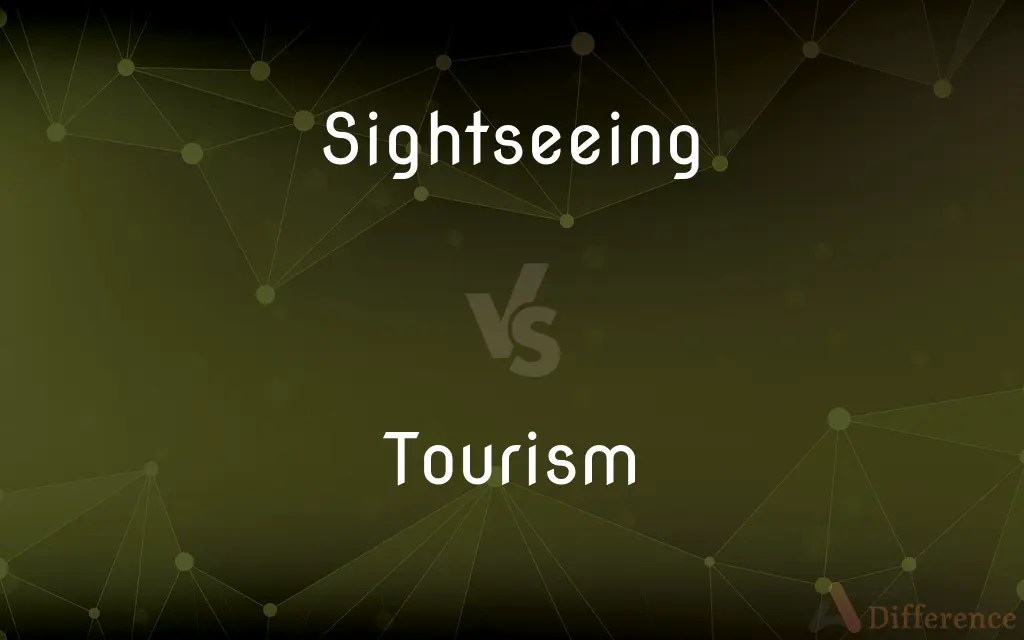Sightseeing vs. Tourism — What's the Difference?
By Maham Liaqat & Fiza Rafique — Updated on March 28, 2024
Sightseeing involves visiting places of interest to see their attractions, focusing on specific locations or landmarks, while tourism is a broader concept that includes travel for pleasure or business, encompassing accommodations, activities.

Difference Between Sightseeing and Tourism
Table of Contents
ADVERTISEMENT
Key Differences
Sightseeing is an activity undertaken by travelers who specifically aim to visit and observe places of interest, often including historical sites, natural wonders, and cultural landmarks. It is typically a part of a larger travel experience but focuses on the visual exploration of specific attractions. On the other hand, tourism is an industry as well as an activity that encompasses not just sightseeing but also includes planning, accommodation, transport, and activities related to the entire travel experience. Tourism can be for various purposes, including leisure, business, health, or religious reasons.
Sightseeing is usually a day activity or part of a day, where tourists visit one or several attractions within a short time frame. It often involves guided tours, photography, and short walks. Conversely, tourism is a more comprehensive term that covers the entire duration of a trip, from departure to return, and includes all the experiences and services used during this time, such as hotels, restaurants, and transport services.
The main goal of sightseeing is to see and experience specific places of interest, often to gain knowledge, appreciate beauty, or understand the cultural significance of the location. Whereas the goal of tourism can vary widely, including relaxation, adventure, cultural immersion, or personal growth, and is not limited to visual experiences.
Sightseeing can be seen as a component of tourism, where it represents the activity of visiting places that are significant for their historical, cultural, or natural values. Tourism, however, refers to the entire process and industry that facilitates people traveling to and exploring places outside their usual environment for personal or business purposes.
While sightseeing is an individual or group activity focusing on exploring and experiencing places, tourism has a broader economic, social, and environmental impact, influencing and involving local communities, economies, and ecosystems.
ADVERTISEMENT
Comparison Chart
Definition
The activity of visiting and seeing attractions in a particular place.
The activity and industry of traveling for pleasure or business, including accommodations, sightseeing, and other experiences.
Focus
Specific landmarks, historical sites, or natural wonders.
Broad, including travel, accommodation, experiences, and activities.
Duration
Typically part of a day or a specific short period during travel.
Encompasses the entire duration of a trip, from planning to return.
Purpose
Primarily to observe and appreciate specific attractions.
Can vary widely, from leisure and adventure to business and education.
Impact
Mostly limited to personal experience and knowledge gain.
Broader economic, social, and environmental implications and contributions.
Compare with Definitions
Sightseeing
Visiting places of interest to see their attractions.
Sightseeing in Paris often includes the Eiffel Tower and Louvre.
Tourism
Influencing and involving local communities and environments.
Sustainable tourism in Costa Rica focuses on conservation and community benefits.
Sightseeing
Participating in guided tours to learn about attractions.
The sightseeing tour of the ancient ruins was informative and engaging.
Tourism
The industry that supports travelers with services and experiences.
The tourism sector includes hotels, restaurants, and entertainment.
Sightseeing
Exploring cultural and historical significance through visual experiences.
Sightseeing in Rome involves immersing oneself in its rich history.
Tourism
Contributing to the local economy and cultural exchange.
Tourism in Bali supports traditional crafts and dances.
Sightseeing
Observing landmarks and natural wonders.
Sightseeing in the Grand Canyon offers breathtaking views of its vast expanse.
Tourism
Engaging in various activities like leisure, adventure, and cultural exploration.
Tourism in New Zealand is popular for adventure sports and Maori culture.
Sightseeing
Taking photographs of famous sites and landscapes.
Sightseeing in Kyoto is incomplete without pictures of its historic temples.
Tourism
Traveling for pleasure, including accommodations and activities.
Tourism in Hawaii thrives due to its beautiful beaches and resorts.
Sightseeing
The act or pastime of visiting sights of interest.
Tourism
The commercial organization and operation of holidays and visits to places of interest
The tourism industry
A national fund for the promotion of tourism
Sightseeing
Used or engaged in sightseeing
A sightseeing bus.
A sightseeing tour.
Tourism
Tourism is travel for pleasure or business; also the theory and practice of touring, the business of attracting, accommodating, and entertaining tourists, and the business of operating tours. The World Tourism Organization defines tourism more generally, in terms which go "beyond the common perception of tourism as being limited to holiday activity only", as people "traveling to and staying in places outside their usual environment for not more than one consecutive year for leisure and not less than 24 hours, business and other purposes".
Sightseeing
The activity of going out looking at things; tourism.
Sightseeing is a frequent reason to visit San Francisco.
Tourism
The practice of traveling for pleasure.
Sightseeing
Present participle of sightsee
Tourism
The business of providing tours and services for tourists.
Sightseeing
Going about to look at places of interest
Tourism
The act of travelling or sightseeing, particularly away from one's home.
Mass tourism damaged the beach.
Tourism
The industry in which such travels and sightseeing are organized.
Tourism brings a lot of tax revenue to the area.
Tourism
The business of providing services to tourists;
Tourism is a major business in Bermuda
Common Curiosities
What defines tourism?
Tourism encompasses all aspects of travel for pleasure or business, including accommodations, sightseeing, and various activities, supported by a vast industry.
What is the economic impact of tourism compared to sightseeing?
Tourism has a broader economic impact, affecting local economies through various services and industries, whereas sightseeing primarily impacts individual businesses related to specific attractions.
What is sightseeing?
Sightseeing is the activity of visiting places of interest, particularly landmarks, natural wonders, and cultural sites, to see and appreciate their attractions.
What role does the tourism industry play in a country's economy?
The tourism industry plays a crucial role by generating revenue, creating jobs, and promoting cultural exchange and understanding among visitors and local communities.
How do sightseeing and tourism differ in focus?
Sightseeing focuses on visiting specific attractions, while tourism includes the broader experience of travel, from accommodations to a range of activities.
How can tourists engage in responsible sightseeing and tourism?
Responsible tourists can engage in activities that respect the local culture, economy, and environment, such as choosing sustainable accommodations and respecting landmarks and natural sites.
Can sightseeing be considered a part of tourism?
Yes, sightseeing is often a significant component of the tourism experience, focusing on exploring and experiencing specific places of interest.
What are the challenges faced by the tourism industry?
Challenges include managing environmental impact, preserving cultural heritage, and ensuring the benefits of tourism are distributed equitably among local communities.
How has the concept of tourism evolved over time?
Tourism has evolved from elite travel for leisure and health to a mass phenomenon driven by the desire for new experiences, adventure, and cultural exchange, supported by advancements in transportation and technology.
How does the purpose of sightseeing differ from tourism?
The purpose of sightseeing is mainly to observe and appreciate attractions, while tourism's goals can be diverse, including relaxation, adventure, and cultural immersion.
Share Your Discovery

Previous Comparison
Vine vs. Bine
Next Comparison
Dramatise vs. DramatizeAuthor Spotlight
Written by
Maham LiaqatCo-written by
Fiza RafiqueFiza Rafique is a skilled content writer at AskDifference.com, where she meticulously refines and enhances written pieces. Drawing from her vast editorial expertise, Fiza ensures clarity, accuracy, and precision in every article. Passionate about language, she continually seeks to elevate the quality of content for readers worldwide.
















































